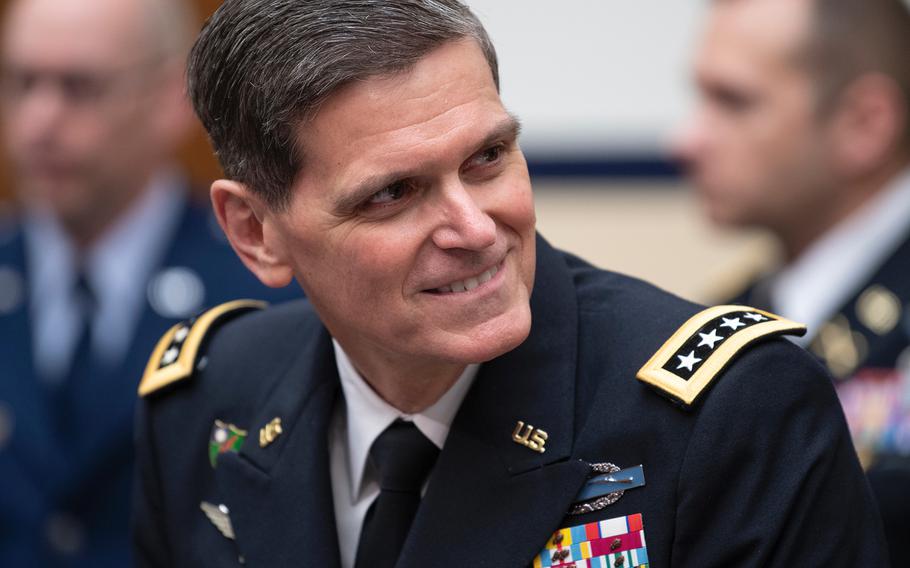
Commander of the U.S. Central Command Gen. Joseph Votel smiles on Thursday, March 7, 2019, before the start of a House Armed Services Committee hearing on Capitol Hill in Washington. (Carlos Bongioanni/Stars and Stripes)
WASHINGTON — The top U.S. commander in the Mideast told House lawmakers Thursday that he has not been ordered to withdraw most American forces from Syria by a specific date, telling them troops would leave as military conditions in the fight against the Islamic State allowed.
Describing ISIS fighters as “unrepentant, unbroken and radicalized,” Army Gen. Joseph Votel warned they remained committed to the terrorist organization and committed to the group’s return to the prominence it achieved in 2014 as it swept across Syria and Iraq capturing some 35,000 square miles.
However, the Islamic State’s so-called caliphate has now been reduced to less than one square mile of territory in an eastern Syrian village, the U.S. Central Command chief told the House Armed Services Committee. Votel indicated major combat operations were expected to be completed soon against ISIS, but the U.S. withdrawal of most of its roughly 2,000 troops in Syria ordered by President Donald Trump in December would not necessarily coincide with the caliphate’s collapse.
“Reduction of the physical caliphate is a monumental military accomplishment, but the fight against ISIS and violent extremism is far from over and our mission remains the same,” he said. “While ISIS has been battered … we should be clear in our understanding that what we are seeing now is not the surrender of ISIS as an organization but, in fact, a calculated decision to preserve the safety of their families and preservation of their capabilities ... waiting for the right time for a resurgence.”
Votel called for the U.S. military to remain committed to the Syrian Democratic Forces, which will be responsible for securing the region against an ISIS resurgence in Syria.
The Pentagon announced last month that it would leave a small residual force of about 400 mostly U.S special operators in Syria to aid stabilization efforts following the caliphate’s fall. Votel said Thursday that planning for that force had not been completed.
Votel, who is set to retire after relinquishing command later this month, also pledged continued U.S. support for Iraqi security forces.
As the general testified Thursday – alongside Marine Gen. Thomas Waldhauser, the chief of U.S. Africa Command, and Kathryn Wheelbarger, the acting assistant secretary of defense for international security affairs – a watchdog organization warned ISIS was already actively re-emerging in areas of Iraq where it had been defeated.
“ISIS is re-establishing capable insurgent networks in multiple historic strongholds and linking them together, setting the conditions for future offensive operations against the government of Iraq,” announced the Institute for the Study of War, a Washington-based think tank that has monitored ISIS since it first emerged.
In Iraq, ISIS fighters have established their presence in key areas including in and around Mosul, their former Iraqi capital, as well as near the towns of Hawija and Baqubah and in parts of Anbar province, ISW reported Thursday. The terrorist group is also actively recruiting Iraqi Kurds in the semi-autonomous Iraqi Kurdistan region in the country’s northern region, potentially in an effort “to create a new insurgent threat” there, the organization has found.
Votel said the U.S. military is still helping train Iraqi security forces and endorsed the capabilities of Iraq’s Counter Terrorism Service to stifle any ISIS resurgence. The Counter Terrorism Service saw much of the frontline fighting against ISIS in recent years.
The general also told lawmakers that he was confident that the small force of American troops left in Syria and the presence of thousands of additional U.S. forces in the region would be capable of handling any potential ISIS comeback in that country.
”We will have the capabilities we need to do the missions we are asked to do,” he said.
dickstein.corey@stripes.com Twitter: @CDicksteinDC